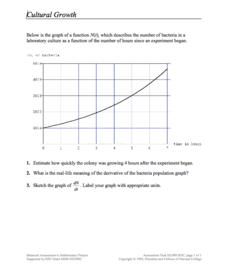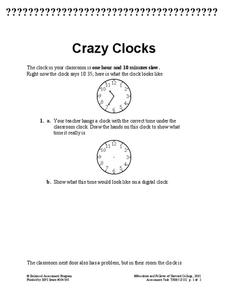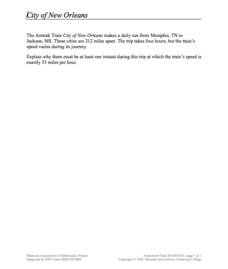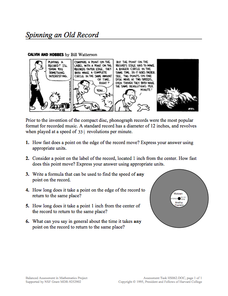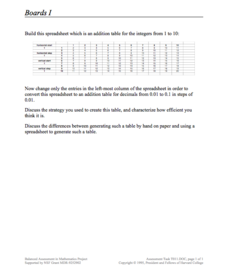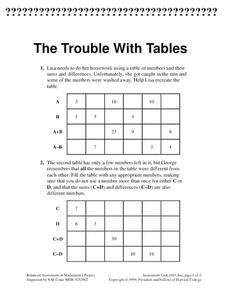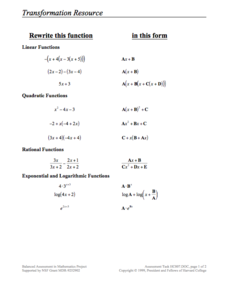Concord Consortium
Cultural Growth
Scholars read and interpret a graph relating bacterial growth in a culture over time. They apply knowledge of derivatives, estimation, and graphing to the skill practice questions.
Concord Consortium
Crossing the Axis
Mathematicians typically reference eight different types of functions. Scholars learn about the requirements for graphing a function and must decide how many different functions fit. To finish, they define each specific function meeting...
Concord Consortium
Crazy Clocks
While a stopped clock is right twice a day, a fast or slow clock confuses people for weeks. Scholars observe a clock running slow and must correct it before observing a clock running fast and working it backward. Finally, a multi-step...
Concord Consortium
City of New Orleans
In the United States, most trains operate at a top speed of 100 miles per hour. Scholars use information on the distance and time of a train trip to determine if the train ever reaches a specific speed. They connect pieces of information...
Concord Consortium
Cities and Gas Stations
In Utah, one stretch of highway goes for 106 miles without a single gas station. Where should people build one? Scholars face the dilemma of where to place a new gas station between three cities. They consider distance and proximity to...
Concord Consortium
Circumscribed Polygon
Trigonometry teachers often go off on a tangent, and here's a worksheet that proves it! First, young mathematicians use a formula with tangent to prove a formula correct for area. Then, they draw conclusions about the area of a circle...
Concord Consortium
Cheetah's Lunch
Run like a cheetah. A performance task challenges pupils to solve several different problems involving the speed of a cheetah. Given information for scenarios where the cheetah chases its prey, they determine if the big cat is fast enough.
Concord Consortium
Spinning an Old Record
Take a trip back in time to examine angular velocity. Using the revolutions per minute, learners calculate the speed of a point on a 33 record. They compare the speed of a point on the edge of the record to the speed of a point closer to...
Concord Consortium
In Oz We Tryst
The shortest distance from point A to point B is a straight line, but measuring distance gets more complicated when there are three points! Given the location of three friends, individuals determine the best point for all three friends...
Concord Consortium
Gravity
Weight is a function of the distance from sea level. Learners explore the many implications of this fact in an inquiry-based task. Given the function, pupils answer questions before manipulating the function to rewrite the distance from...
Concord Consortium
Broken Spreadsheet I
There is power in spreadsheet formulas and learners use this power to model quadratic data. Given a scatterplot of a parabola, pupils create formulas in a spreadsheet to populate the data. The formulas they use lead to an understanding...
Concord Consortium
Boards I
Learners create patterns in a table to mimic the function of an electronic spreadsheet. The result is a table that creates an addition table for decimals in intervals of one-tenth. While creating the pattern, pupils must thoroughly...
Concord Consortium
Bicycle Chain
Model a bicycle chain with circles and tangent lines. Given the dimensions of the sprocket wheels, young scholars calculate the length of the chain that surrounds them. A second task has learners write a function for the length of a...
Concord Consortium
Catching Up
Class members have some catching up to do. Given a linear equation describing the distance of a runner, young mathematicians interpret the equation in terms of the context. They consider a general equation of the same form and describe...
Concord Consortium
Calculator Numbers
Know thy calculator. Young mathematicians use their calculators to answer a set of questions. They consider how the number of digits the calculator displays affects the answers to calculations. They then find examples of computations...
Concord Consortium
Build a Box
Strive for gold with an informative resource. A short task challenges learners to investigate the thickness of a box made from a given volume of gold. The box must have specific dimensions, so setting up and solving a literal equation is...
Concord Consortium
The Trouble with Tables
Tackle these tables. A performance task has learners complete two puzzles using addition and subtraction. They must fill in tables with missing addends, sums, minuends, subtrahends, or differences.
Concord Consortium
Writing and Sketching II
Find the function that fits. Scholars first identify the graph of a function that looks the same after a horizontal translation. They must then find the equation of a function whose graph lies only in two adjacent quadrants.
Concord Consortium
Writing and Sketching I
Writing and sketching functions—what more could you want to do? Learners write and sketch functions that meet certain conditions as they complete a short task. They find a parabola that encompasses three quadrants of the coordinate plane...
Concord Consortium
The Six Faces of Amzora
Here's a task that is out of this world! Given a description of a fictional cube-shaped planet, scholars answer a set of questions about the planet. They create a two-dimensional map and consider the distances between locations on the map.
Concord Consortium
Three Circles
Round and round and round we go. Given a diagram of three circles, two of which share a point with the third circle, learners identify the radius of each circle. Doing so requires setting up and solving a system of equations based on the...
Concord Consortium
Track of Dreams
Don't run from the resource—sprint to it. Using an engaging performance task, scholars consider a set of constraints on the creation of a track. Given several possible designs, they determine if the designs meet the constraints. If not,...
Concord Consortium
Transformations Resource
Transform your lesson for transforming functions. Scholars transform linear, quadratic, exponential, rational, and trigonometric expressions. They write their expressions to fit specific forms and identify the values of the resulting...
Concord Consortium
Transformations-Diagnostic
Change the way you teach about rewriting expressions. A diagnostic task asks learners to transform expressions in different ways. Given two linear expressions and two quadratic expressions, they rewrite them into the indicated forms.


